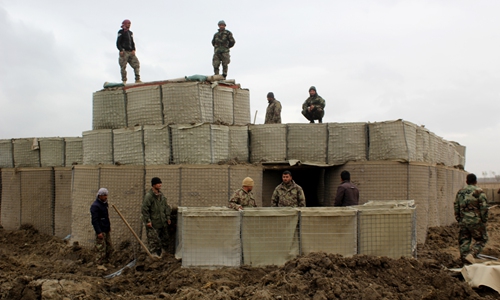
Afghan security forces stand guard at an Afghan National Army outpost after an attack by Taliban militants, in Kunduz Province, Afghanistan on Wednesday. Photo: AFP
The Taliban on Wednesday welcomed the Pentagon's announcement it would soon pull about 2,000 US troops from Afghanistan as a "good step" that will help end the country's long-running conflict.The Pentagon on Tuesday said the US will slash troop levels in Afghanistan and Iraq to their lowest levels in nearly 20 years of war after President Donald Trump pledged to end conflicts abroad.
"It is a good step and in the interest of the people of both countries," Taliban spokesman Zabihullah Mujahid told AFP, referring to the US and Afghanistan.
"The sooner the foreign forces leave, the more the war will be prevented."
Critics have expressed concerns that a precipitous departure could embolden the Taliban and erode gains made since 2001, when US-led forces ousted the hard-line Islamists in the wake of the September 11 attacks.
The latest Pentagon move would see 2,000 US troops quit Afghanistan by January 15, less than a week before President-elect Joe Biden is expected to be sworn into office.
The withdrawal follows outgoing Trump's plan to end US military involvement in Afghanistan.
Under a deal signed February 29, the Trump administration agreed to pull all foreign forces from the country by May 2021.
In return, the Taliban promised not to attack US forces and said they would stop transnational jihadist groups like Al-Qaeda and Islamic State from operating in the country.
In Kabul, some expressed alarm over the US troop withdrawal.
"The Taliban will escalate violence in a bid to seize more political power in Afghanistan, putting Afghanistan on a dangerous path," bookseller Mahdi Mosawi said.
Another capital resident, Fatima Safari, said the withdrawal would undermine hard-won women's gains.
During the Taliban's rule between 1996 to 2001, women were forced to wear burqas and those accused of adultery were sometimes executed.
"Women might not be able to play a role that they are used to now," Safari said.
AFP
